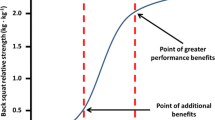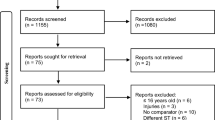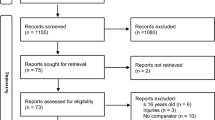Abstract
Purpose
The purpose of the study was to investigate the effect of exergames «Wii Nintendo Sports» on psychological and physiological parameters of young adults.
Methods
In the present study, twenty (N = 20) students of the School of Physical Education and Sport Sciences of Democritus University of Thrace aged from 20 to 25 years old volunteered. The participants were randomly divided into two groups, the experimental (N = 10) and control group (N = 10). The experimental group used as a training method the exergames «Wii Nintendo Sports», while the control group did not participate in any training program. The experimental group participated in a 10 weeks pilot study of Nintendo’s Wii sports, with three 30 min sessions a week. Subjective vitality, body weight, body mass index, maximum oxygen uptake and maximum heart rate of the participants were examined, before and after the intervention program.
Results
Results of the present study revealed that exergames did not affect the participants’ body weight, body mass index, maximum oxygen uptake and maximum heart rate. On the contrary, it was found that only the experimental group achieved a significantly better subjective vitality, between the pre- and post-test.
Conclusions
In conclusion, exergames are effective tools for achieving a better subjective vitality in young adults.
Similar content being viewed by others
References
Andersen R, Crespo C, Bartlett S, Cheskin L, Pratt M (1998) Relationship of physical activity and television watching with body weight and level of fatness among children. J Am Med Assoc 279:938–942
Kraus H, Raab W (1961) Hyokinetic disease: diseases produced by lack of exercise. Thomas, Springfield
Sieverdes JC, Ray BM, Sui X, Lee DC, Hand GA, Baruth M et al (2012) Association between leisure-time physical activity and depressive symptoms in men. Med Sci Sports Exerc 44:260–265
Bouchard C, Blair SN, Haskell WL (2007) Physical activity and health. Human Kinetics, Champaign
World Health Organization (2003) Annual global move for health initiative: a concept paper. WHO, Geneva
Nani S, Matsouka O, Tsitskari E, Avgerinos A (2017) The role of physical activity in life happiness of Greek drug abusers participating in a treatment program. Sport Sci Health. https://doi.org/10.1007/s11332-016-0345-2
Penedo FJ, Dahn JR (2005) Exercise and well-being: a review of mental and physical health benefits associated with physical activity. Behav Med 18(2):189–193
Trost SG, Owen N, Bauman AE, Sallis JF, Brown W (2002) Correlates of adults’ participation in physical activity: review and update. Med Sci Sports Exerc 12:1996–2001
Hagger M, Chatzisarantis N, Biddle S (2001) The influence of self-efficacy and past behavior on the physical activity intentions of young people. J Sport Sci 19:711–725
Pitsavos C, Panagiotakos DB, Lentzas Y, Stefanadis C (2005) Epidemiology of leisure-time physical activity in socio-demographic, lifestyle and psychological characteristics of men and women in Greece: The ATTICA study. BMC Public Health 5:37
Tzormpatzakis N, Sleap M (2007) Participation in physical activity and exercise in Greece: a systematic literature review. Int J Public Health 52(6): 360–71
Αpostolakis Ν, Antoniou P (2010) When Children Use Computers and the Internet, are They Lost for Sports? Proceedings of EDEN 2010 Annual Conference “Media Inspirations for Learning: What makes the Impact?”. Universidad Politecnica de Valencia, Valencia
Patsi C, Antoniou P, Batsiou S, Bebetsos E, Lagiou K (2012) Exergames and their effect on emotional state in people with Schizophrenia. Balk Mil Med Rev (BMMR) 15(4):275–281
Vernadakis Ν, Gioftsidou Α, Antoniou P, Ioannidis D, Giannousi M (2012) The impact of nintendo wii to physical education students’ balance compared to the traditional approaches. Comput Educ 59(2):196–205
Vernadakis N, Kouli O, Tsitskari E, Gioftsidou A, Antoniou P (2014) University students’ ability-expectancy beliefs and subjective task values for exergames. Comput Educ 75:149–161
Baranowski T, Baranowski J, O’Connor T, Lu AS, Thompson D (2012) Is enhanced physical activity possible using active video games? Games Health J 1(3):228–232
Staiano AE, Calvert SL (2011) Exergames for physical education courses: physical, social, and cognitive benefits. Child Dev Perspect 5(2):93–98
Peng W, Lin J-H, Crouse J (2011) Is playing exergames really exercising? A meta-analysis of energy expenditure in active video games. CyberPsychol Behav Soc Netw 14:681–688
Ryan RM, Frederick C (1997) On energy, personality and health: subjective vitality dynamic reflection of well-being. J Pers 65:529–565
Vlachopoulos SP, Katartzi ES, Kontou MG, Moustaka FC, Goudas M (2011) The revised perceived locus of causality in physical education scale: psychometric evaluation among youth. Psychol Sport Exerc 12:583–592
Wagener TL, Fedele DA, Mignogna MR, Hester CN, Gillaspy SR (2012) Psychological effects of dance-based group exergaming in obese adolescents. Pediatr Obes 7(5):68–74
Adamo KB, Rutherford JA, Goldfield GS (2010) Effects of interactive video game cycling on overweight and obese adolescent health. Appl Physiol Nutr Metab 35(6):805–815
Goldfield GS, Adamo KB, Rutherford J, Murray M (2012) The effects of aerobic exercise on psychosocial functioning of adolescents who are overweight or obese. J Pediatr Psychol 37(10):1136–1147
Maddison R, Foley L, Mhurchu N et al (2011) Effects of active video games on body composition: a randomized controlled trial. Am J Clin Nutr 94(1):156–163
Unnithan VB, Houser W, Fernhall B (2006) Evaluation of the energy cost of playing a dance simulation video game in overweight and non-overweight children and adolescents. Int J Sports Med 27:804–809
Wang ES, Chen LS, Lin JY, Wang MC (2008) The relationship between leisure satisfaction and life satisfaction of adolescents concerning online games. Adolescence 43(169):177–184
Bianchi-Berthouze N, Kim WW, Patel D (2007) Does body movement engage you more in digital game play? and why? In Proceedings of the 2nd international conference on Affective computing and intelligent interaction. Berlin: Springer-Verlag
Mackintosh KA, Standage M, Staiano AE, Lester L, McNarry MA (2016) Investigating the physiological and psychosocial responses of single and dual-player exergaming in young adults. Games Health J 5(6):375–381
Lin J-H (2015) “Just dance”: the effects of exergame feedback and controller use on physical activity and psychological outcomes. Games Health J 4(3):183–189
Ryan RM, Deci E (2008) From ego-depletion to vitality: theory and findings concerning the facilitation of energy available to self. Soc Pers Psychol Compass 2:702–717
Author information
Authors and Affiliations
Corresponding author
Ethics declarations
Conflict of interest
The authors declare that they have no conflict of interest.
Ethical approval
All procedures performed were in accordance with the ethical standards of the institutional and the Helsinki Declaration.
Informed consent
All of the subjects sign the consent form.
Rights and permissions
About this article
Cite this article
Nani, S., Matsouka, O. & Antoniou, P. Can ten weeks intervention with exergames contribute to better subjective vitality and physical health?. Sport Sci Health 15, 43–47 (2019). https://doi.org/10.1007/s11332-018-0475-9
Received:
Accepted:
Published:
Issue Date:
DOI: https://doi.org/10.1007/s11332-018-0475-9




